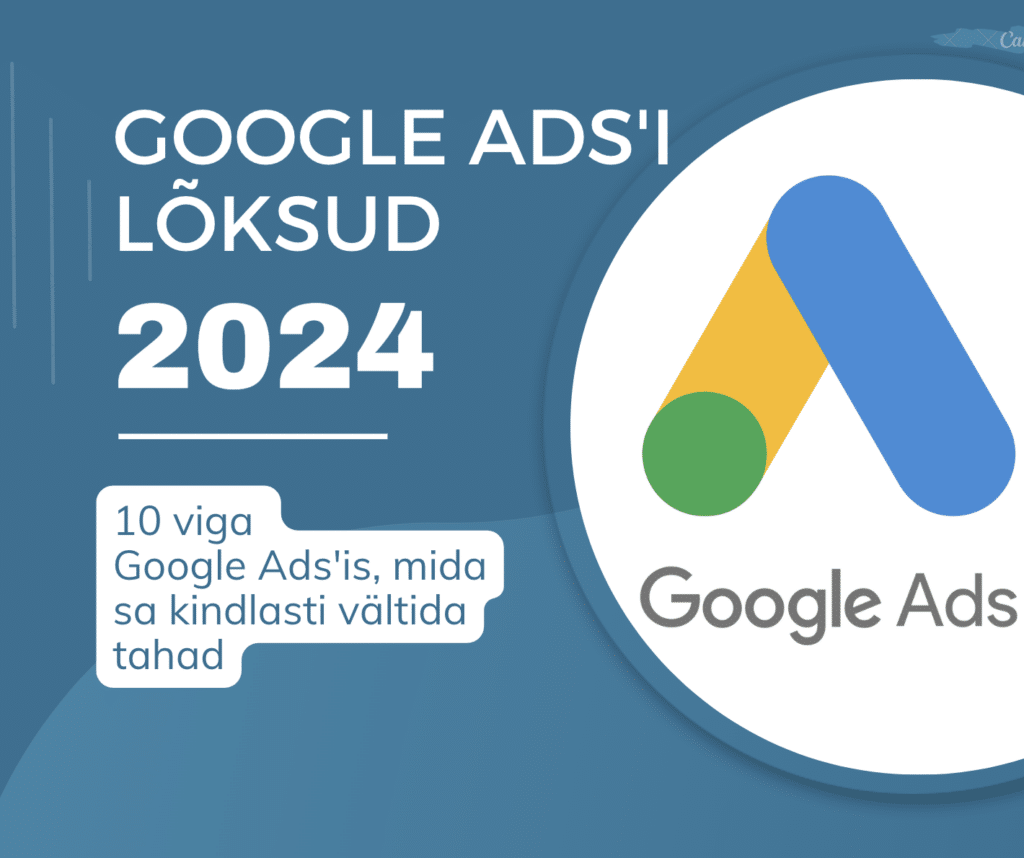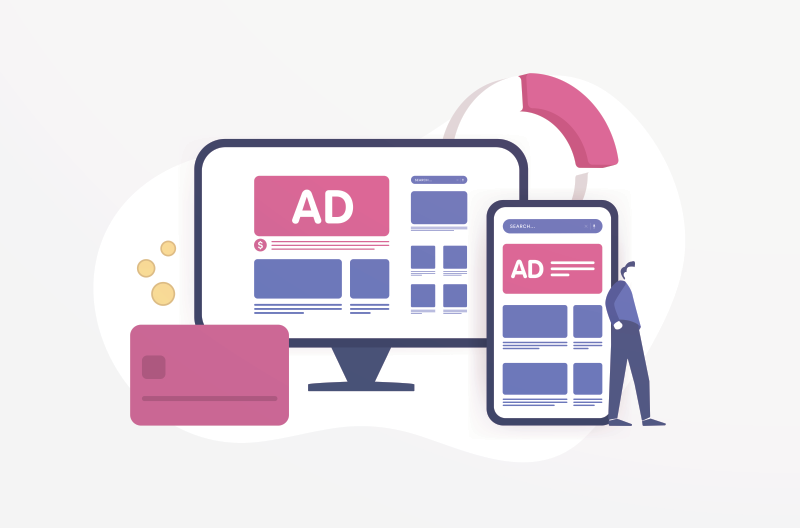Google vs Facebook advertising: Which platform is better for your business?
In the digital marketing landscape, businesses are often faced with the choice of investing in Google ads or Facebook ads to reach their target audience and achieve their marketing goals.
Both platforms offer unique advantages and opportunities, but their effectiveness depends on the specific needs and objectives of the business.
- Google Ads, which focus on search-based targeting, allow businesses to capture potential customers at the moment they are actively searching for information or solutions, thereby providing a high conversion rate and a direct sales opportunity.
- Facebook ads, on the other hand, take advantage of the platform’s huge user base and deep targeting capabilities, allowing you to create a more emotional connection with your target audience through visually appealing ads that target users’ interests and behaviours.
Choosing between platforms requires an understanding of their specificities and how each of them can support a particular business’s marketing strategy to increase digital visibility and achieve business objectives.
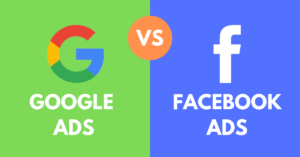
Google advertising: Targeted search
Imagine your business shining at the top of Google search results, as if it were a digital lighthouse guiding the very people who are searching for what you offer.
Google Ads makes this dream a reality by providing a search-based advertising platform that brings your business to the forefront when potential customers are most receptive.
Targeting is the key – Google Ads targets your messages directly to those searching for your products or services, ensuring your ads reach not just the right people, but the right people. This means a higher ROI and more efficient use of your marketing budget.
The cost is flexible and friendly – you only pay when someone clicks on your ad. This pay-per-click (CPC) model means that every cent of your budget works in your favour, bringing qualified traffic to your website.
Immediate visibility is critical for your business. With Google Ads, you don’t have to wait for your page to rise organically – your ads will immediately appear at the top of search results, giving you instant visibility and increasing your chances of catching customers’ attention at just the right moment.
Measurability is what makes Google Ads a truly valuable tool. Accurate tracking and measurement allow you to get detailed information on clicks, conversions and more, helping you optimise your campaigns in real time and maximise your return on investment.
Google Ads isn’t just an advertising platform; it’s a catalyst for your business growth, allowing you to reach the right people at the right time and in the right place. Take a step ahead of your competitors and let Google Ads unlock the full digital potential of your business.
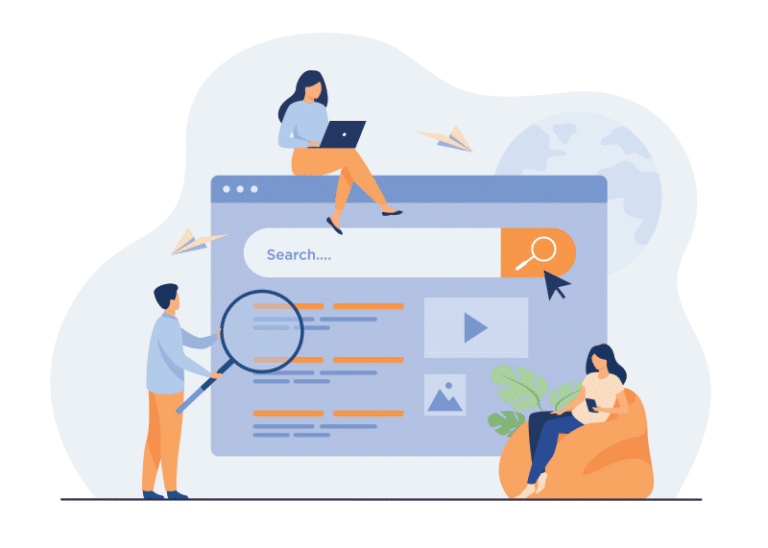
Facebook ad: widespread reach with a "cold" target audience
The world of Facebook ads, where every campaign is like a finely tuned symphony, each note carefully chosen to resonate with exactly those people who most appreciate what you have to offer.
Facebook Ads are more than just a social media advertising platform; they’re the gateway that connects your brand with billions of active users on Facebook, Instagram and Audience Network, creating meaningful interactions and building brand loyalty.
- Targeting is at the heart of Facebook ads. As a company, you have the opportunity to dive deep into a world of demographics, interests and behaviours, offering you the chance to reach your ideal target audience with a level of accuracy that you’re unlikely to find elsewhere. Whether you’re targeting young mums, techies or travel fanatics, Facebook ads allow you to target them based on their personal interests and lifestyle.
- The variety of formats in Facebook ads gives you the freedom to experiment and find that perfect way to get your message across. Whether you prefer eye-catching images, captivating videos, dynamic carousels or personalised story ads, Facebook offers you a platform where your creativity can fly and where every ad is an opportunity to tell a story that speaks to you.
- Brand awareness has never been easier to achieve than with Facebook ads. These ads aren’t just visible; they’re designed to create an emotional connection and increase brand awareness, making your business an unforgettable part of people’s everyday lives.
- Cost is another important aspect that makes Facebook ads an attractive choice. A flexible payment model that includes both CPC (cost per click) and CPM (cost per thousand impressions) gives you control over your budget, ensuring that every cent spent gets you closer to your business goals.
Facebook Ads aren’t just an advertising platform; they’re a powerful tool to help you build deep and lasting relationships with your audience. Make the most of this opportunity to bring your brand story to millions of people and see your business flourish in a digital world where the possibilities are endless.
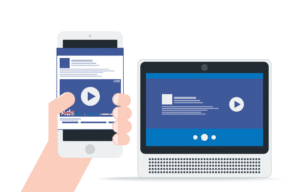
Should you choose Google Ads or Facebook Ads?
Google vs Facebook advertising – this dilemma is as old as time itself in the world of digital marketing. The real choice lies in your company’s marketing objectives and what you want to achieve.
If your main goal is to hit potential customers at the very moment they are actively searching for the products or services you offer, Google Ads will provide the precision and timing you need. These adverts are like precisely aimed arrows, flying straight at people who have already expressed an interest in your field.
On the other hand, if your goal is to expand awareness of your brand, build deeper relationships with potential customers, or reach specific demographics or interest groups, Facebook ads are your best allies. These ads are like friendly conversations that take place right where your target audience spends their time, providing visually appealing and emotionally engaging content.
But why limit yourself to one when you can harness the power of both platforms?
By combining search-based targeting of Google Ads with demographic targeting of Facebook Ads, you can create a comprehensive marketing strategy that not only increases your visibility, but also strengthens your brand’s position in the market. This approach ensures that your message reaches the right people at the right time and in the right place.
It is important to understand
Every business is unique, and so there is no single formula that works for everyone. Tailoring your marketing strategies to your specific needs and objectives is the key to successful digital marketing. Whatever your choice, remember that both Google and Facebook Ads are valuable tools to help your business grow.
Both platforms have their strengths and weaknesses:
When planning their marketing strategies, companies are often faced with the choice between investing in Google or Facebook ads. Google vs Facebook advertising – both platforms have their own strengths and weaknesses that affect their suitability for different marketing purposes. Below is a comparison to help customers understand when and why to choose one platform over another.
Google Ads
Pros:
- Highly intentional targeting: Google ads are based on user search queries, which means that ads are shown to people who are actively searching for your product or service. This increases the chance of conversion rates.
- Measurability: Google provides detailed analytics tools that allow you to accurately calculate ROI and track campaign effectiveness.
- Fast visibility: ads appear immediately in search results, offering a fast way to reach your target audience.
Cons:
- Higher cost-per-click (CPC): for popular search terms, competition can be fierce, driving up the cost of clicks.
- Limited creativity: the format of advertisements is mostly text-based, which limits the use of visual content.
Facebook Ads
Pros:
- Extensive targeting: Facebook allows you to target ads based on demographics, interests and behaviour, helping you reach exactly the right audience.
- Versatile ad formats: Offers a wide range of ad formats from video ads to story ads, enabling more creative and engaging content.
- Increasing brand awareness: Facebook ads are effective for increasing brand awareness as they allow you to engage with your target audience even when they are not actively looking for your products or services.
Cons:
- Lower immediate conversion rate: as people may not actively search for products or services while on Facebook, the conversion rate may be lower compared to Google ads.
- The need for constant content updates: to remain engaging and effective, Facebook ads require regular updates and new content creation.
Measuring and optimising advertising effectiveness
Measuring the effectiveness of advertising campaigns and optimising them is at the heart of digital marketing, especially when it comes to Google and Facebook ads. These two platforms are equipped with sophisticated analytical tools that open the door to a deep understanding of campaign performance. Whether it’s click-through-rate (CTR), conversion rate or any other key metric, each detail helps to build a clear picture of what’s working and what needs improvement.
- Google Ads stands out for its ability to shed light on the effectiveness of keywords, showing exactly which terms attract the most traffic and generate conversions.
- Facebook Ads, on the other hand, provides invaluable insight into your audience’s reactions to different advertising messages and visuals, allowing you to finely target and speak to your audience.
This continuous data management and campaign adjustment is not just a matter of increasing ROI. It’s an opportunity to dive deep into the psychology of your target audience to understand their needs and preferences, which in turn allows you to slice and dice your marketing strategy to meet their exact expectations.
An effective advertising campaign is not just about numbers and graphs; it is a continuous process that requires attention, adaptation and creativity. Continuous optimisation is not just a technique – it’s an art that allows you to resonate with your target audience, providing them with value and strengthening your brand’s position in the digital world. It’s a journey that takes you through the digital marketing maze, ensuring that every step is geared towards success, making every click and conversion part of a bigger picture that shapes the future of your business.
Conclusion:
Google and Facebook ads both offer powerful ways for businesses to reach their target audience and achieve their marketing goals, but their approaches and strengths are different. Google Ads are ideally suited when the goal is to target users who are actively searching for your products or services, delivering immediate and measurable results to an audience with a high propensity to buy.
Facebook ads, on the other hand, allow you to target users based on their demographics, interests and behaviours, making it an excellent tool for building brand awareness and creating a deeper emotional connection with your target audience.
-
The choice between these two platforms depends on your specific business objectives:
Whether you want to generate direct sales and enquiries, or prefer to focus on building brand awareness and engaging with your target audience. Often the most effective approach is to use both platforms together to maximise their strengths and compensate for their weaknesses, creating a comprehensive digital marketing strategy that covers all the necessary aspects to achieve business objectives.
All in all, Google and Facebook ads complement each other, offering different ways to reach your target audience. A successful marketing campaign requires an understanding of the strengths of both platforms and their strategic use according to business needs and marketing objectives.
-
Google vs Facebook advertising
Choosing can be difficult, but you are not alone in this decision. As an experienced marketing professional, I am ready to help you develop and implement an effective advertising strategy that meets the unique needs of your business. Contact me and together we will choose the optimal platform for your advertising, making the most efficient use of your budget and resources.


